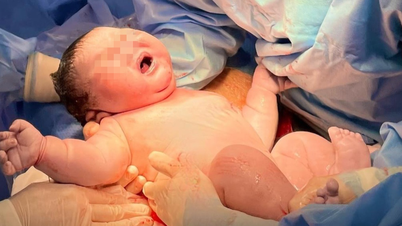I am 18 weeks pregnant and have just been diagnosed with dengue fever. What should I eat and drink to reduce fever safely? (Thuy An, 29 years old)
Reply:
The Hanoi Department of Health recorded about 28,480 cases of dengue fever in 30 districts, towns, and cities as of November 6. The number of cases tends to increase, averaging about 2,400-2,700 cases per week.
Pregnant women often have reduced immunity, making them susceptible to infection and disease. You are 18 weeks pregnant and have just contracted dengue fever, so don't worry too much. You need to stay relaxed, reduce your fever, and rest properly.
The diet needs to increase the amount of fluids and salt such as fruit juices rich in vitamin C, oresol, porridge, soup, to reduce pressure on the intestines.... You should eat a full range of nutrients, avoid spicy, greasy foods that cause indigestion. You should limit your intake of sweets while you are sick because sugar affects the body's process of killing bacteria.

Pregnant women can add orange juice to increase resistance. Photo : Freepik
In the early days, if the pregnant mother's fever is not over 38 degrees, she just needs to apply warm compresses and wipe areas such as the forehead, groin, armpits, and temples to cool down.
During the monitoring and treatment at home, she had one of the signs of a serious illness that required immediate hospitalization for emergency care. Symptoms include severe abdominal pain or muscle pain; persistent vomiting (at least three times in an hour); nosebleeds or bleeding gums; vomiting blood, blood in the stool; rapid breathing, difficulty breathing; severe fatigue, cold hands and feet, restlessness, lethargy...
Pregnant women should not buy medicine to take on their own. Dengue fever in pregnant women is unpredictable and progresses quickly. When arriving at the hospital, the doctor will continuously monitor the pregnant woman's condition to avoid dangerous complications.
Dengue fever is an infectious disease that can be transmitted from mother to fetus, causing the risk of miscarriage and stillbirth. When the disease becomes severe, low platelets can easily cause serious complications such as bleeding, premature placental abruption, preeclampsia, etc. Newborns may have platelet deficiency in the first few days, lasting for several weeks after birth.
Dr. Hoang Ngoc Anh
Obstetrics and Gynecology Center, Tam Anh General Hospital Hanoi
| Readers ask questions about obstetrics and gynecology here for doctors to answer |
Source link









































































































Comment (0)